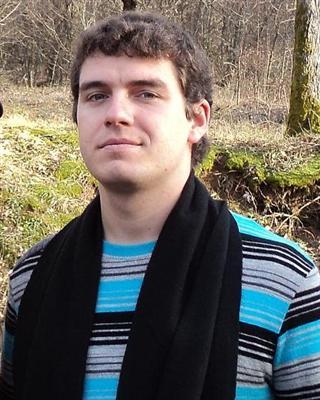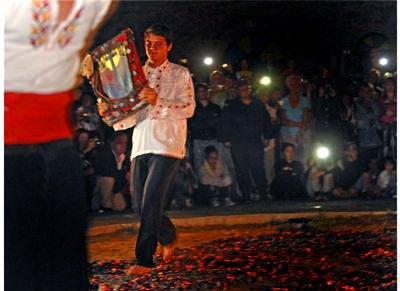The Strandzha Mountain in Southeastern Bulgaria has given the name of a specific folklore area with well-preserved traditions. The mysterious tradition of fire dancing continues to live here. A distinct rhythm created by bagpipes and drums is also characteristic of the region with its nostalgic songs with exquisite ornamentation. Kostadin Mihailov (born in 1991) is a representative of the younger generation of singers and fire dancers from Strandzha.

© Photo: private archive
"I was born in the village of Brodilovo in the Strandzha Mountain. My ancestors are refugees from Eastern Thrace. These Bulgarian lands remained within the borders of Turkey in the beginning of the 20th century. I expressed a desire to sing when I was a little boy. I started learning songs from the repertoire of singer Veselina Ilieva. When I grew up I started searching and recording old songs. I learned about 150 songs from 101-year-old Pluma Vulchanova. I have collected over 800 songs in total. I first started performing at folk gatherings in the local villages of Bulgari, Kosti, Sinemorec, and Rezovo. In 2002 I performed at a competition organized by the Stara Zagora Radio and received an award – a recording with the folk orchestra of the school in Kotel. I became student of the Strandzha folk singer Zlatka Stavreva and I performed in her authentic folk band – “Nestinarche."
Kostadin Mihailov was welcomed in the children’s folk band Nestinarche as a soloist and won a number of awards. In 2008 he started studying in the music school in Burgas - his teachers there were Penka Petrova, conductor of the school choir and Thracian folk singer Stoyan Ganchev.
Today 23 -year-old musician holds fifteen special and 35 first prizes:
"I have participated in a number of national and international folk forums. In high school I took part in the Strandzha Singing Festival in the village of Gramatikovo and won the special award. I have won twice awards with songs of Strandzha singer Georgi Pavlov. I have also grabbed the special Georgi Pavlov Prize. I have four consecutive awards from my participation in the "Folk Crown” festival near the town of Sredets and others.”
Kostadin Mihailov takes part not only in festivals in Strandzha but in folk contests in the Thracian region. These include "With the Songs of Elena Gramatikova" and the national children's contest "Whistle Playing" in Bolyarovo. One of his big awards is the first place in the competition "With the Songs of Valkana Stoyanova."
The young Bulgarian singer has performed in France and the UK, too.
“Today, young singer Kostadin Mihailov is a teacher of history and music in the elementary school in the town of Kostinbrod. He says daily pedagogical work brings him satisfaction. He also continues his education at the University of Library Studies and Information Technology. He chose to study there due to his desire to continue studying the folklore legacy of his home region. A few months ago he became the chairman of the Bulgarian Guardians Association. Together with like-minded colleagues from the University he aims at preserving authentic folk music, dances, customs, and traditional crafts. The Association organizes concerts and other events, promoting Bulgarian folklore in schools and community centers. This year a book by Kostadin Mikhailov entitled "Field Theory of Folklore and Folk Art," was published, too. It contains authentic Strandzha songs, legends, and customs.

© Photo: private archive
Besides being a singer, teacher and researcher of folklore, Kostadin Mihailov has another talent – he is a ‘nestinar,’ which means is able to dance barefoot in glowing embers. This is a unique custom from the region of Strandzha, which intrigued him since he was a child. During festivities he used to carry the icons of St. Constantine and Helena and when he became 13 he felt a strong desire to dance in the embers. That is how he became one of the youngest “nestinars” in Bulgaria. He believes in the profound sense and the energy of the ritual and has something to say to those who try to distort traditions.
"I try to avoid talking about fire dancing even with friends. For me dancing is a sacred moment. One needs a whole year to prepare for the ritual. What bothers me is the fact that in recent years the focus of the ritual has shifted and it has become something of a show. According to old Bulgarian traditions we dance for people's health and prosperity. My attitude to fire dancing performed for entertainment in restaurants is negative. This is a commercial practice and true nestinars do not approve of it. We believe that St. Constantine and Helena protect us and we hope that the authenticity of the tradition would be preserved.”
English version: Alexander Markov
With performances of selected songs from their repertoire, the Svetoglas male chamber ensemble will celebrate 15 years on stage . The four singers: Daniel Spasov, Stanimir Ivanov, Nikolay Boyanov and Milen Ivanov sing acapella (without instrumental..
One of the biggest music events for the year is taking place tonight in Arena hall in Sofia – a concert by Lili Ivanova. 15,000 will be able to watch the legend of Bulgarian pop perform live in the hall, and many more than that will be able to live..
In the most magical time of the year, we turn to fairy-tale characters and plots with the first Bulgarian Christmas musical entitled "Batko Koleda" (Big Brother Christmas). The interest in it is so great that due to the rapid sale of tickets for the..
One of the latest releases is "Christmas Miracle" , performed by young singers Stefani Ilieva and Stoycho Stoychev, aka STOYCHOS. "With this duet we..
Christmas is a very special holiday for Bulgarian pop singer Rumiana Kotseva . For years in a row, she gathers her family and friends in her home -..

+359 2 9336 661
